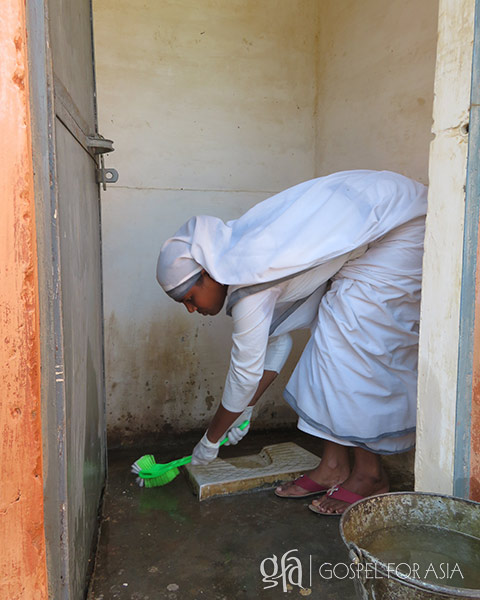
Clad in white robes lined with a gray stripe across the hem, a group of Gospel for Asia (GFA) Sisters of Compassion walked the rural road to one of the schools in their area. Specifically trained to minister to the lowest in society and do the most menial tasks, the specialized women missionaries were ready to teach students about sanitation and do what no one else wanted to do: clean the school’s toilets.
Unknowingly Risking Their Lives
Across the globe, 2 billion people do not have access to basic sanitation facilities. Around 673 million of those 2 billion defecate in the open.[1] But even when a sanitation facility is available to the public or a family owns a private one, many, like in the village these Sisters of Compassion work in, do not use it.
“There are many people who have a sanitation facility at their home,” said Laranda, one of the Sisters of Compassion, “but they keep it locked or use it as a storeroom to keep their firewood and other stuff.”
Instead, the villagers use the fields to relieve themselves, unaware that poor sanitation is the cause of 432,000 diarrhea-related deaths.[2]
Clean Latrine, Clean Life
This outing was not a strange occurrence for the Sisters. Every November 19, which is recognized as World Toilet Day, Gospel for Asia (GFA) workers across Asia organize events to educate communities on proper hygiene.
This time, these Sisters of Compassion taught and encouraged students about the importance of using a toilet, how to use one and how to properly keep it clean so they can keep themselves clean and free from illness.
Every home and school that has a sanitation facility is blessed, said the leader of the team of Sisters. To use them, she encouraged, would prevent sickness. According to a joint report by the World Health Organization and the United Nation’s Children Fund, 5 out of 10 schools in South Asia and 4 out of 10 households do not have hand-washing facilities with soap and water for their students or family members.[3]
The students and some teachers were surprised the Sisters performed a task that only someone who they considered “low class” would do. They admired the women missionaries for setting a good example in their society.
When the Sisters left the school, they left behind thankful and better-informed students and staff. But the Sisters’ work was not done; they had another school to visit. There, they would do the same thing: clean the toilets and teach the students how to stay safe against disease. Proper practices can save lives.
—-
